
I will be attending the Flirty in Tampa book festival on October 5. It promises to be a great day, and I hope I will see you there! Eventbrite has all of the ticket information here: https://tinyurl.com/3x598fyf

Author of Historical Fiction and Nonfiction

I will be attending the Flirty in Tampa book festival on October 5. It promises to be a great day, and I hope I will see you there! Eventbrite has all of the ticket information here: https://tinyurl.com/3x598fyf
The Sunshine State Book Festival and the Amelia Island Book Festival were both fantastic events. I look forward to next year’s events. My next scheduled event will be in Tampa in October-more on that later!
Summer is actually upon is here in Florida. Temperatures have already hit the 90s, and our winter birds (human as well as avian) have moved back to their normal territories. We’re even easing into our summer rains-it’s very grey at the moment, and there is a bit of thunder in the air. Our whistling ducks, however, came by for lunch. They are usually here in the morning. It was a treat to see them in the afternoon!

Thoughts of summer leads me to thoughts of vacation. I know I will be at the beach soon, and will be taking a new book to read, as well as a writing project. Maybe you will need a new novel for a beach read, or for that lazy day on the porch. Just a thought…

I wish you a wonderful summer, however you find yourself spending it.
This weekend, February 17-18, 2023, is the Amelia Island Book Festival in beautiful Fernandina Beach, FL. Celebrity authors David Baldacci, Kate Quinn, Scott Turow, and Jeannette Walls headline the event, which benefits literacy in Nassau County, Florida. On Saturday, the Author Expo will feature numerous authors and genres (including me!). Visit the website at https://tinyurl.com/bdzjsmsa for more information. I hope to see you there!

Today, I’m posting on the English Historical Fiction Authors’ Blog…
Diaries and sketchbooks fascinate me, especially those of women. Many of my favourites happen to have been drawn or written by English women in earlier times. The ability to depict one’s daily life in a way that is clear and entertaining to a third party, whether in art or in writing, is a real talent. (My own efforts tend to read more like the essay read in Cheech and Chong’s “Sister Mary Elephant”.) One cannot always assume that a diary written by a woman, especially a young, unmarried woman living with her parents or guardian, expressed her true feeling or opinions as her diary may not have been private. However, the details of one’s daily activities and the people with whom time was spent can give the viewer an idea of how life was lived on an intimate level. I’d like to introduce three of my personal favourites.
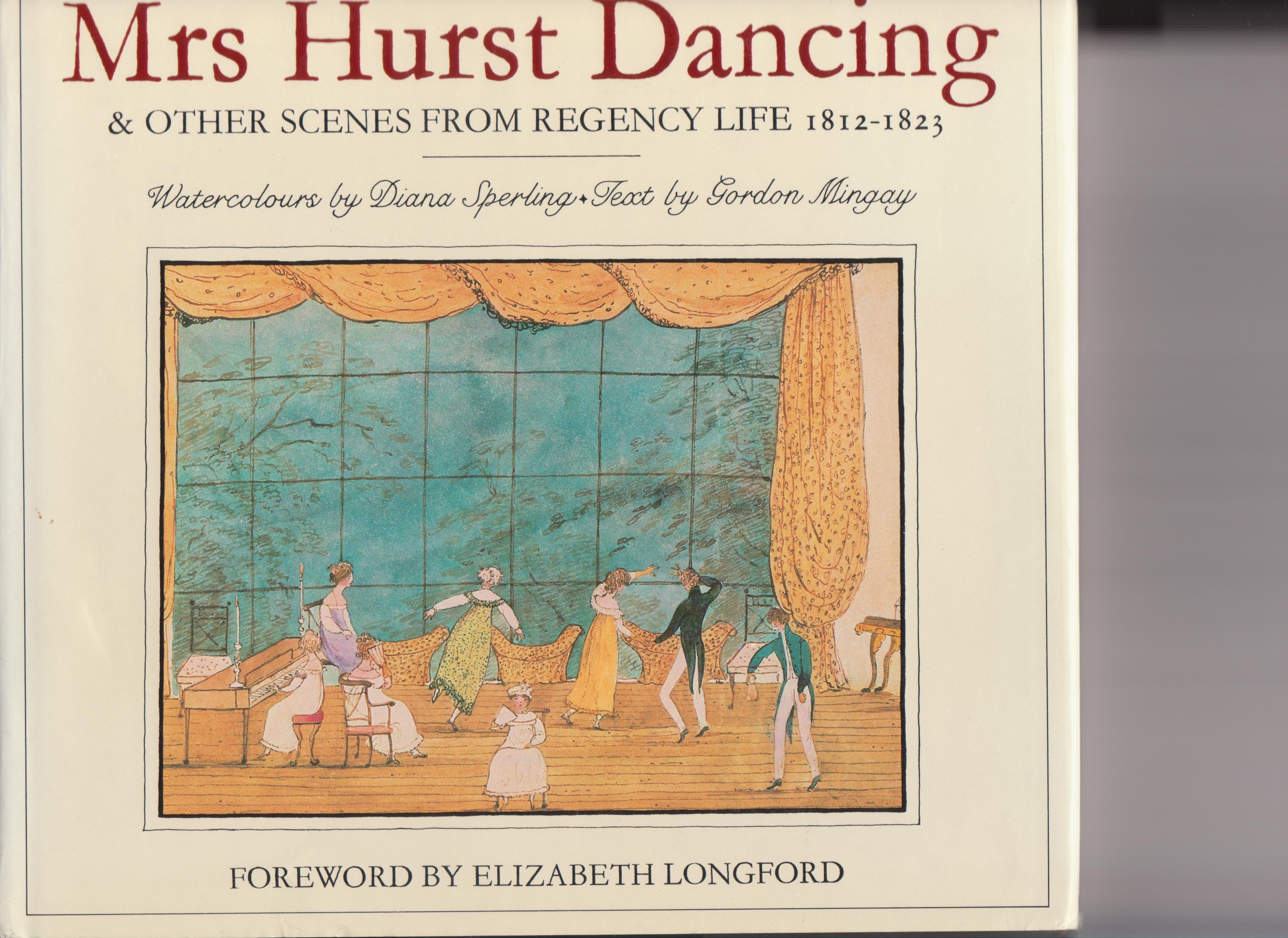
To read more, please visit the English Historical Fiction Authors’ Blog HERE
Continue reading “Women’s Lives Recorded in Sketchbooks and Diaries”
It is my pleasure to welcome author Prue Batten to the blog today. The official release date for Michael, the third book in The Triptych Chronicle, is July 20th. Today, Prue is going to tell us about the journey to this point and a bit about Michael. Enjoy!
Journeys…
As I approach the launch of the last in my historical fiction trilogy, I’m beset with quite a few emotions.
The Triptych Chronicle was a step into a world that I’ve become comfortable with. Like pulling on that favourite sweater – the soft one that cossets on a cold day but which itches if the sun burns too brightly. So this one has itched to be written and then when I sink into the writing, feels as if I’m wrapped in cashmere.
In my own reading experience, and with the exception of Dorothy Dunnett, I had read very few historical fiction books that dealt with the insidious world of trade. Even less were there fictional writings of twelfth century trade which I felt might have been the precursor to vibrant Renaissance trade.
I wanted to read about it, so I wrote it!
Learning about trade has been a journey into gilded danger, excitement and venality as each of the various commodities traded from east to west were sourced. It seems that in writing the trilogy, I was constantly surrounded by fragrance, by glitter or by extremes of colour. It required a far stronger person than I not to be overawed by the beautiful aromas of spices, by the sheer drama of polished and sparkling gems and whispering silks or by the minerals from which the powders and pigments were acquired for great western church art. Nor could I remain unswayed by the mystery of farflung places that were the sources of these breathtaking goods. And then there were the truly fabulous commodities – in the case of my novels, the dye called Tyrian purple and a finely woven silk cloth called byssus.
So, as I approach the release – it’s not like clicking off e-Bay or Facebook. It’s saying farewell to an intrepid group of men and women who dealt in merchandise, and who tried to survive the jealousies and danger that were aroused as they strode through the streets of Constantinople and Lyon.
Which brings me to the greatest emotion of all.
Loss.
For four years now, the people I write about have been my closest friends and allies. I know every mark on their bodies, every expression, every thought. It will be infinitely sad to say goodbye. The one good thing is that I have only to pick a title off the shelf or open my Kindle to be back amongst them. A relief then, that they’re not gone for good. (Those that survived, that is. Sadly, some of the best did not…)
It’s also a time when I farewell the twelfth century about which I will have written six novels and a number of short stories. Sometimes I wonder if it will be a permanent goodbye or just a gentle ‘see you later’. Whatever the case, it’s a kind of tectonic culture shift. For me, writing about the age was like writing about an early-onset Renaissance. Never let it be said that the Middle Ages weren’t filled with their own beauty and inventiveness.
And of course, there are the range of personal emotions experienced during the four years of writing. My husband’s battle with cancer (which he won), a child marrying, another child moving to the other end of the island, a favourite dog (one of my muses) passing away and the first grandchild on the cusp of being born. Also joining with like minds in an environmental fight against salmon farms. Then my own personal battle with an obscure vestibular condition. The astonishing thing is how each of these events has imbued itself through the novels in the ranges of emotions my characters feel. They are very empathic, those people from within the trading house of Gisborne-ben Simon – the kind one would always hope to have in one’s circle.
Writing a series of novels is a journey. Not just for the characters but for the writer. One comes out the other side older, wiser and all things being equal, ready to do it all again. But then let’s face it – the simple art of writing is a journey into the cryptic corners of rather a lot of souls.
Never let it be said otherwise…
![]()
Prue Batten’s The Triptych Chronicle (Tobias, Guillaume, Michael) has won awards, most recently, a Chaucer Award from Chanticleer for Guillaume. Each book is a standalone but each of the characters after whom the books are titled are known to each other, and each story is linked by a thread of a revenge, and each of the men feature in the other’s stories.
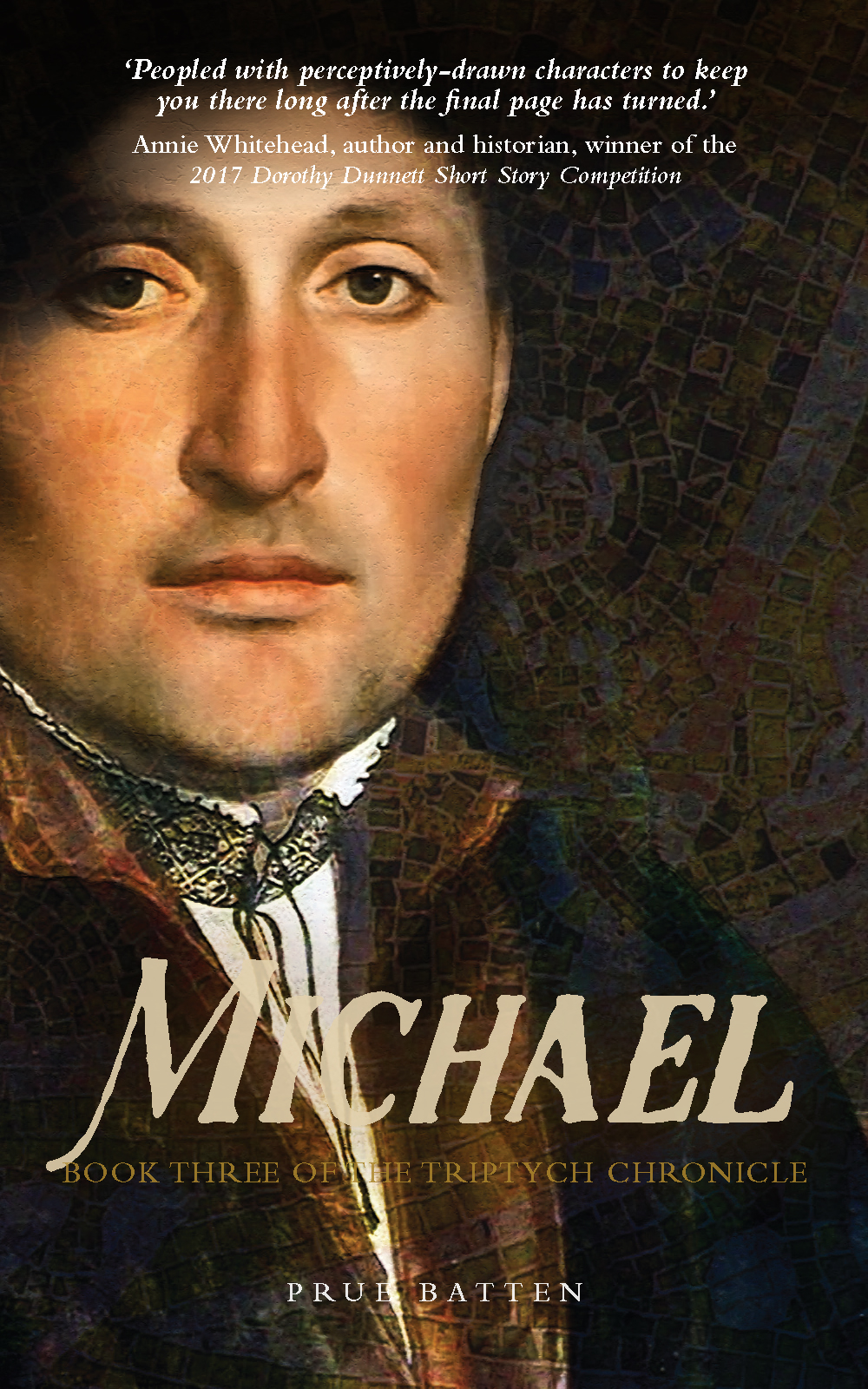
To find out more about Prue and her work, see below:
Website: Here
Facebook: Here
Pinterest: Here
Amazon: Here

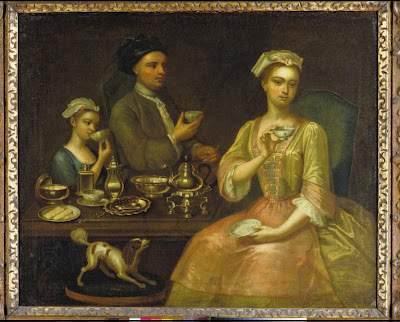
Tomorrow, Prue Batten will be visiting the blog to discuss her writing journey and the release of the third novel in The Triptych Chronicle, Michael. Looking forward to an excellent post by a terrific writer! Don’t miss it…
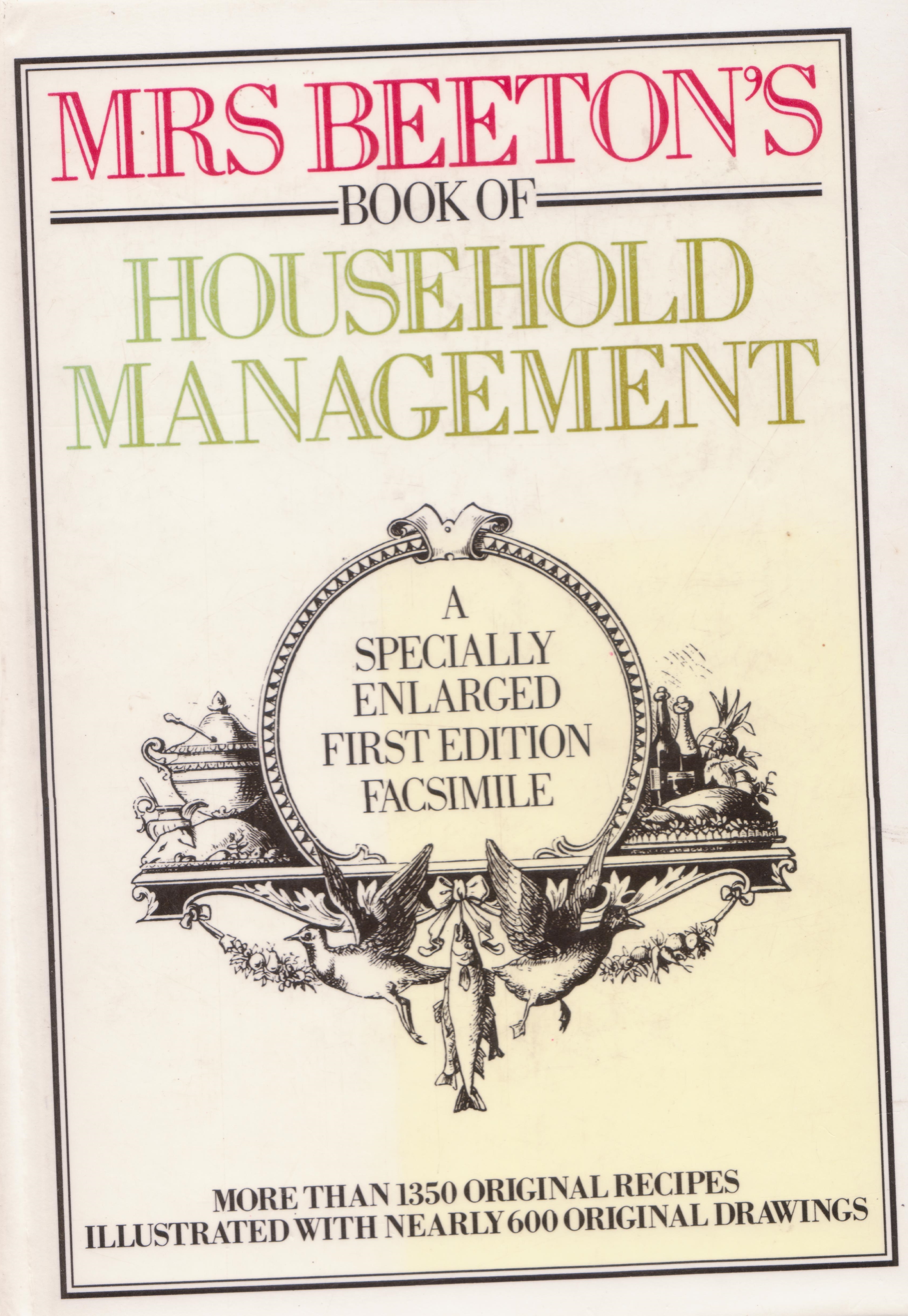
As noted before, I really enjoy old cookbooks. The information they contain tell us so much about life in earlier times. Not only do they tell us what people ate and how their food was prepared, they contain information about medicine, sanitary concerns and other things. For some time, I have wanted a copy of that stalwart of the Victorian home, MRS BEETON’S BOOK OF HOUSEHOLD MANAGEMENT. Finally, a facsimile of the original volume published in 1861 surfaced. Not only does it contain the original material, including illustrations, the print matter is enlarged so it is easier for me to read. (I am increasingly appreciative of larger print.) It is a rather bulky volume, but a delight to read none the less.
One of the things I particularly like is Mrs. Beeton’s list of foods in their seasons. She divided them into categories (Fish, Meat, Poultry, Game, Vegetables and Fruit), then discussed what is available each month, including commentary on possible quality. For example, in February, she listed several fish that were still available for purchase in February but were not as good as they were in January, as well as other fish that were not subject to that concern. While other books have similar information, Mrs. Beeton’s seems to be more detailed. This kind of information can bring a story to life in many ways, ranging from a dialogue between characters about what to buy to a detail about a character’s favorite dish. If nothing else, it gives an author confidence about the accuracy of the details in the story.
The illustrations are black and white drawings, and the use of the illustrations is interesting as well. Mrs. Beeton included drawings of the ingredients before cooking (herbs, chickens, trees, etc.) as well as pictures of the final dishes.
For example, in the section of recipes for chicken, she included pictures and details regarding different varieties of chicken. See below:
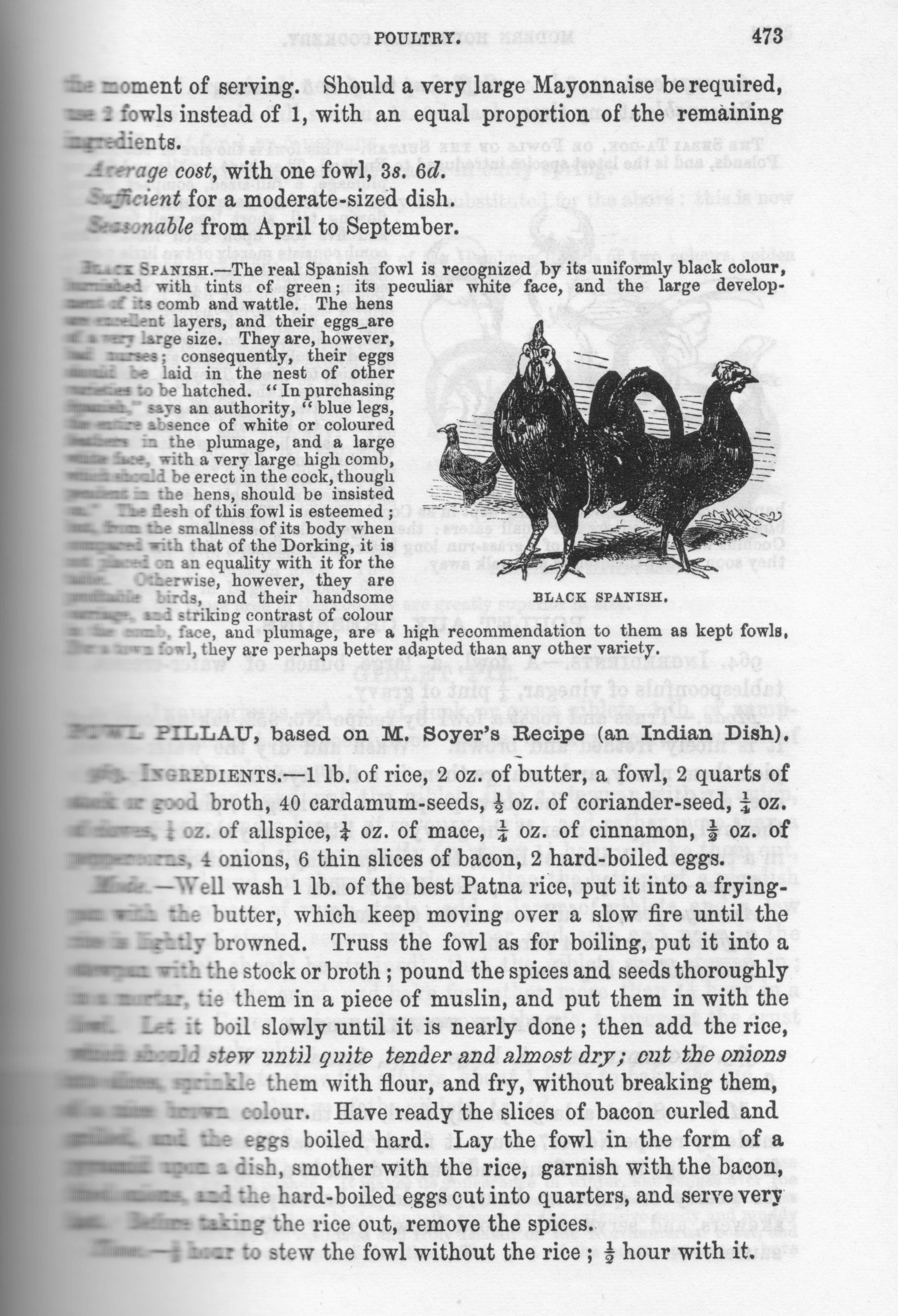
I’m sure this was intended as a help to the ladies of the house, but it’s very interesting to the modern reader as well.
This is a useful and fascinating addition to my library. I look forward to using it.
Source:
Beeon, Mrs. Isabela. MRS BEETON’S BOOK OF HOUSEHOLD MANAGEMENT. Originally published in 1859-61 in monthly supplements to S. O. Beeton’s The Englishwoman’s Domestic Magazine. First published by S. O. Beeton in 1861 as one volume entitled THE BOOK OF HOUSEHOLD MANAGEMENT. Enlargement: London: Chancellor Preess, 1982, 1984, 1985, 1986, 1987.
Illustrations are scanned from my personal copy.
On Jane Austen’s London blog, Louise Rule considers March weather and a fascinating cook book from 1812. There are a couple of recipes as well if you want to experiment!
Today, Regina Jeffers will be discussing issues of succession and the release of her new novel, THE EARL CLAIMS HIS COMFORT.
What happens to a peerage if the peer cannot be found or is presumed dead? What becomes of his wife? His children? This is a familiar plot in many Regency novels. I used it in the first book of my Twins’ trilogy, Angel Comes to the Devil’s Keep. Angelica Lovelace’s father is the third son in the family, but when his eldest brother goes missing and the second son is dispatched with in an unusual plot twist, Horace Lovelace becomes the heir presumptive to the title. However, no one can be certain of the eldest’s death. People saw the Peer go overboard on his “honeymoon,” but there is always the possibility of his still being alive. [No “Gilligan’s Island” plot, but anything is possible.] Obviously, the authorities must wait to see if the Peer’s wife is pregnant and if she delivers forth a son, who would then be the heir apparent and displace Horace in the line of succession, but then what?
Such a search could take forever if there is no child to become the heir. We customarily think that after a person is missing for seven years, that he is declared dead, but that is not so in the case of a peerage. The search could take several lifetimes, though the Committee on Privilege of the House of Lords and the College of Arms may choose to set a time limit. Until the Peer is officially declared dead, his “widow” cannot remarry.
It could be possible for the heir apparent or the heir presumptive to act in the Peer’s place to oversee the property and the business of the peerage, but he cannot officially claim the title until a decision on the Peer’s death has been made.
Another incidence of inheritance plagues book 2 of the Twins’ trilogy, The Earl Claims His Comfort. In it, a doppelgänger attempts to unseat Levison Davids, 17th Earl of Remmington, by claiming the earldom is his rightful heritage. So what really occurs when there is a question as to the line of succession?
First, let us clear up some misconceptions. The most confusing of those, for some, is the difference between an heir apparent and an heir presumptive. The heir apparent can only be the peer’s oldest living son or the oldest of his grandsons ( son of the oldest son), if the peer’s oldest son is deceased. What’s most important to remember is that “if a man inherits a peerage, it is because he is the eldest surviving legitimate male who can trace a direct (father to son) lineage back to an earlier holder of the peerage. In other words, he doesn’t inherit because he was the brother or the cousin or the uncle of his predecessor, but because his own father, or grandfather, or great-grandfather, or great-great-grandfather, etc., was an earlier holder of the peerage. [“Eldest” in this context doesn’t mean that he happens to be the oldest of several different living men who can trace a direct line back to an earlier holder of the peerage, but rather that his line is the eldest, i.e., eldest son of eldest son; and all other lines senior to his have died out.]” (“Hereditary Peerages” https://www.chinet.com/~laura/html/titles03.html)
Although it has taken various forms, the Peerage Roll has existed since the Roll kept by Garter Principal King of Arms in 1514. The early ones still in the custody of the House of Lords are those from 1621, 1628, and 1661. Garter’s Roll was the official roll of the House until 1827. From 1827 to 1999, a sessional Roll became a part of Parliament’s history. After the passing of the House of Lords Act in 1999, the Clerk of the Parliaments ceased to preserve the Roll. Since the enactment of this parliamentary law, the Crown Office issues the Writ of Summons to those 92 hereditary peers remaining in the House of Lords. There is no longer an automatic entitlement to a Writ of Summons to the HOL, but this was not so during the Regency.
To claim a peerage during the Regency (and even now), certain statutory declaration evidence must be supplied by the claimant. For a son, this would include evidence of his birth, his parents’ marriage (and that they were married BEFORE his birth, not necessarily before his conception), the previous Peer’s death, and evidence that the late Peer had no legitimate surviving male issue before the birth of the claimant (meaning he had no elder legitimate surviving brothers). For a brother to succeed, the claimant would need all of the above plus evidence that the late Peer had no legitimate male issue and there was no surviving male issue between the birth of the Peer and that of the claimant (meaning the late Peer had no surviving sons). For a nephew to succeed, the person needed proof of his birth, his parents’ marriage, the birth of his father, the death of his father, the death of the deceased Peer, evidence that the late Peer had no surviving legitimate male issue, that there was no surviving legitimate male issue between the birth of the late Peer and that of the claimant’s father, and the claimant’s father had no surviving male issue before the birth of the claimant.
To make such a claim from a position of collateral succession, meaning those who stand to receive a portion, or all, of a deceased individual estate, but who are not direct descendants of the deceased person, the claimant needed to provide evidence of his birth, evidence to show the claimant is descended from the collateral relations of the Peerage/grantee, and evidence to show that all male lines from the very first Peer are senior to that of the claimant are extinct, and that no male senior to the claimant in. his. own line is still living.
Resource for parts of this piece come from the Ministry of Justice, Crown Office, House of Lords “Guidance Notes on Succession to a Peerage…” http://www.college-of-arms.gov.uk/GuidanceNotes2.pdf
Jeremy Turcotte has a lengthy list of extinct British peerages that was compiled in September 2013. I thought it might be of interest to some of you. Find it at https://jeremyturcotte.wordpress.com/2013/09/21/a-listing-of-extinct-british-peerages/
_______________________________________

Introducing The Earl Claims His Comfort: Book 2 in the Twins’ Trilogy, releasing September 16, 2017, from Black Opal Books
– a 2016 Hot Prospects finalist in Romantic Suspense
Hurrying home to Tegen Castle from the Continent to assume guardianship of a child not his, but one who holds his countenance, Levison Davids, Earl of Remmington, is shot and left to die upon the road leading to his manor house. The incident has Remmington chasing after a man who remains one step ahead and who claims a distinct similarity—a man who wishes to replace Remmington as the rightful earl. Rem must solve the mystery of how a stranger’s life parallels his, while protecting his title, the child, and the woman he loves.
Comfort Neville has escorted Deirdre Kavanaugh from Ireland to England, in hopes that the Earl of Remmington will prove a better guardian for the girl than did the child’s father. When she discovers the earl’s body upon a road backing the castle, it is she who nurses him to health. As the daughter of a minor son of an Irish baron, Comfort is impossibly removed from the earl’s sphere, but the man claims her affections. She will do anything for him, including confronting his enemies. When she is kidnapped as part of a plot for revenge against the earl, she must protect Rem’s life, while guarding her heart.
Purchase Links:
Amazon HERE
Black Opal Books HERE
NOOK HERE
KOBO HERE
Kindle HERE
Barnes & Noble HERE
EXCERPT
“Cannot recall the last time I slept in my own bed,” he murmured to no one in particular as he stood to gain his bearings. The room swirled before his eyes, but Rem shook off the feeling. Of late, it was common for him to know a dull vibrating sound marring his thinking.
Levison Davids, the 17th Earl of Remmington, set the glass down harder than he intended. He had consumed more alcohol than he should on this evening, but as his home shire often brought on a case of maudlin, he had drowned his memories. He turned toward the door, attempting to walk with the confidence his late father always demanded of his sons. Lev was not trained to be the earl. His father had groomed Rem’s older brother Robinson for the role, but Fate had a way of spitting in a man’s eye when he least expected it.
Outside, the chilly air removed the edge from the numbness the heavy drink provided him, and for a brief moment Rem thought to return to the common room to reinforce the black mood the drink had induced. A special form of “regret” plagued his days and nights since receiving word of his ascension to the earldom some four years prior, and he did not think he would ever to be comfortable again.
“Storm comin’,” the groom warned when he brought Rem’s horse around.
“We’re in Yorkshire,” Remmington replied. “We are known for the unpredictable.”
Customarily, he would not permit the groom to offer him a leg up, but Rem’s resolve to reach his country estate had waned. He had received a note via Sir Alexander Chandler that Rem’s presence was required at the Remmington home seat, and so he had set out from France, where he had spent the last year, to answer a different call of duty.
Sir Alexander offered little information on why someone summoned Rem home, only that the message had come from the estate’s housekeeper. Not that it mattered who had sent for him. Tegen Castle was his responsibility. The journey from France had required that Rem leave an ongoing investigation behind, a fact that did not please him, even though he knew the others in service to Sir Alexander were excellent at their occupations. Moreover, the baronet had assured Rem that several missions on English shores required Remmington’s “special” skills, and he could return to service as quickly as his business knew an end.
He caught the reins to turn the stallion in a tight circle. Tossing the groom a coin, Rem kicked Draco’s sides to set the horse into a gallop.
As the dark swallowed them up, Rem enjoyed the feel of power the rhythm of the horse’s gait provided. He raced across the valley before emerging onto the craggy moors. At length, he skirted the rocky headland.
He slowed Draco as the cliff tops came into view. When he reached Davids’ Point, he urged the stallion into a trot. Rem could no longer see the trail, but his body knew it as well as it knew the sun would rise on the morrow. After some time, he jerked Draco’s reins hard to the left, and, as a pair, they plunged onto the long-forgotten trail. He leaned low over the stallion’s neck to avoid the tree limbs before he directed Draco to an adjacent path that led upward toward the family estate, which sat high upon a hill overlooking the breakwaters.
When he reached the main road again, he pulled up on the reins to bring the animal to a halt. Rem patted Draco’s neck and stared through the night at his childhood home, which was framed against the rising moonlight. It often made him sad to realize how much he once loved the estate as a child and how much he now despised it.
“No love left in the bricks,” he said through a thick throat. “Even the dowager countess no longer wishes to reside here. How can I?”
It was not always so. Although he was a minor son, Rem always thought to share Tegen Castle with his wife and children—to live nearby and to relate tales of happier days.
“But after Miss Phillips’s betrayal and then, likewise, that of Miss Lovelace, I possess no heart to begin again.”
In truth, of the two ladies, Rem had only loved Miss Delia Phillips.
“Fell in love with the girl when I was but fourteen and she, ten.”
He crossed his arms over the rise of the saddle to study the distant manor house.
“Perhaps Delia could find no solace here,” he murmured aloud.
Even today, it bothered him that Delia had not cared enough for him to send him a letter denying their understanding. He had learned of Delia’s marrying Baron Kavanagh from Sir Alexander, with whom Rem had served upon the Spanish front. Sir Alexander’s younger brother delivered the news in a cheeky letter.
“I suppose Delia thought being a baroness was superior to being Mrs. Davids. Little did she know I would claim the earldom. More is the pity for her.” A large raindrop plopped upon the back of his hand. “If we do not speed our return to the castle, my friend, we will arrive with a wet seat.”
He caught up the loose reins, but before he could set his heels into Draco’s sides, a shot rang out. By instinct, Rem thought to dive for the nearby ditch. Yet, the heavy drink slowed his response, and before he could act, Remmington knew the sharp sting of the bullet in his thigh.
Draco bolted forward before Rem had control of the stallion’s reins. He felt himself slipping from the saddle, but there was little he could do to prevent the impact. He slammed hard into the packed earth just as the heavens opened with a drenching rain. The back of his head bounced against a paving stone, and a shooting pain claimed his forehead. Even so Rem thought to sit up so he might take cover, but the effort was short coming. The piercing pain in his leg and the sharp sting claiming his vision fought for control. The blow to his head won, and Rem screwed his eyes closed to welcome the darkness.
________________________________________

Angel Comes to the Devil’s Keep: Book 1 of the Twins’ Trilogy
– a 2017 Daphne du Maurier Award for Excellence in Mystery/Suspense finalist
-a SOLA’s Eighth Annual Dixie Kane Memorial Award finalist for Historical Romance
Huntington McLaughlin, the Marquess of Malvern, wakes in a farmhouse, after a head injury, being tended by an ethereal “angel,” who claims to be his wife. However, reality is often deceptive, and Angelica Lovelace is far from innocent in Hunt’s difficulties. Yet, there is something about the woman that calls to him as no other ever has. When she attends his mother’s annual summer house party, their lives are intertwined in a series of mistaken identities, assaults, kidnappings, overlapping relations, and murders, which will either bring them together forever or tear them irretrievably apart. As Hunt attempts to right his world from problems caused by the head injury that has robbed him of parts of his memory, his best friend, the Earl of Remmington, makes it clear that he intends to claim Angelica as his wife. Hunt must decide whether to permit her to align herself with the earldom or claim the only woman who stirs his heart–and if he does the latter, can he still serve the dukedom with a hoydenish American heiress at his side?
_________________________
Meet Regina Jeffers

With 30+ books to her credit, Regina Jeffers is an award-winning author of historical cozy mysteries, Austenesque sequels and retellings, as well as Regency era-based romantic suspense. A teacher for 40 years, Jeffers often serves as a consultant for Language Arts and Media Literacy programs. With multiple degrees, Regina has been a Time Warner Star Teacher, Columbus (OH) Teacher of the Year, and a Martha Holden Jennings Scholar and a Smithsonian presenter.
Every Woman Dreams: https://reginajeffers.wordpress.com
Website: http://www.rjeffers.com
Austen Authors: http://austenauthors.net
Facebook: https://www.facebook.com/Regina-Jeffers-Author-Page-141407102548455/?fref=ts
Twitter: https://twitter.com/reginajeffers
Amazon Author Page: https://www.amazon.com/Regina-Jeffers/e/B008G0UI0I/ref=sr_ntt_srch_lnk_1?qid=1479079637&sr=8-1
Also on Pinterest, LinkedIn, and Google+.
Now for the GIVEAWAY. I have two eBook copies of The Earl Claims His Comfort available to those who comment below. The giveaway will end at midnight EDST on Wednesday, October 4.

On October 1, 2017, we will be entertaining a guest! Noted author Regina Jeffers will be posting on this site, discussing some knotty issues of inheritance, and her new release. Please don’t miss it!
Illustration: “Family of three at tea” by Richard Collins, 1727 (here )